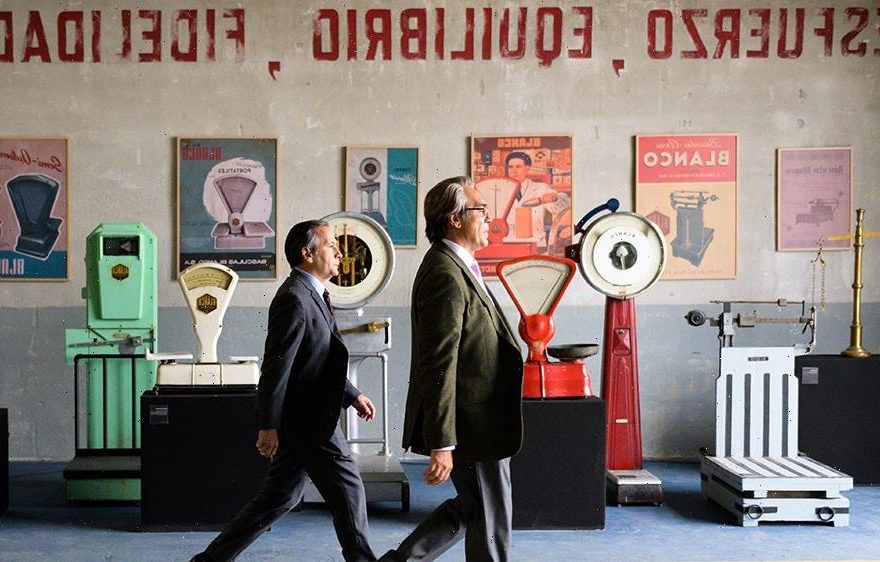Say you’re hitching a ride at the side of a lonely highway, and two cars slow down at once. One is driven by Anton Chigurh, the taciturn, helmet-haired serial killer played to Oscar-winning effect by Javier Bardem in “No Country for Old Men.” At the wheel of the other is Blanco, the grayly respectable factory CEO essayed by the same actor in “The Good Boss.” Seems like an easy choice, though by the end of the latter film, you might be inclined to take your chances with the psychopath.
Blanco probably won’t kill you; not by his own hand, at least. But with each chaotic plot turn of Spanish director Fernando León de Aranoa’s anti-corporate comedy, it becomes clearer that Blanco is the blandest possible incarnation of pure evil: a man with nary a principle, much less a personality, to his name. Yet as played with an inspired fusion of mundanity and menace by Bardem — his natural earthy charisma tamped down beneath shapeless suiting, wire-rimmed glasses and a lank, frosted swadge of executive hair — he’s curiously riveting, and the best reason this amusing but gazpacho-temperature satire has for being. Needless to say, he’ll also draw international distributors to a comedy that might otherwise be quite local in appeal.
“Don’t treat me like a boss,” Blanco keeps telling people with a thin gray smile. You shudder to think how fast it would vanish if you did anything but. We first encounter him giving a smarmy pep talk to the employees at his company, a manufacturer of industrial scales — a detail that León de Aranoa will go on to stress for all the metaphorical value it’s worth, as social imbalance abounds in his busy story. All smiles and handshakes and repeated mentions of community, it’s a performance for the benefit of a local journalist, visiting to big-up the factory in a commissioned puff piece. But it’s also a rehearsal of sorts for a presentation that looms larger in Blanco’s mind: A national committee will soon be arriving to determine the company’s suitability for a prestigious business award, and everything has to be perfect.
Once the visitors are gone, however, that entails a little harsh housekeeping. Among various downsizing measures, longtime employee Jose (Óscar de la Fuente) is summarily dismissed, and doesn’t take it well: Destitute, he sets up camp on a strip of neutral land by the factory entrance, progressively ratcheting up the volume of his one-man protest. Within factory walls, meanwhile, everything is far from hunky-dory. Blanco’s right-hand man, Miralles (Manolo Solo), is distracted by marital woes and flailing professionally — a weakness his boss isn’t above exploiting for the good of the company, even as he drags Miralles to strip clubs in supposed solidarity.
Blanco’s own marriage to world-weary fashion boutique owner Adela (Sonia Almarcha) hasn’t been sacred for years: Attractive new intern Liliana (Almudena Amor) is evidently the latest in a long line of disposable grooming prospects, proving the icky subtext of his public statement that “relationships here go beyond what it says in the contracts.” Yet their one-night dalliance isn’t as strings-free as Blanco initially assumes.
Cue a shift in register from brittle workplace comedy to broad bedroom farce, though one a bit lacking in elastic snap. At two hours, rather intricately stuffed with subplots ranging from frivolous to grimly consequential, “The Good Boss” struggles to pick up the pace when required: The laughs are there, but more spaced out than they could be. The satire, too, lacks poison-arrow sharpness and specificity, beyond the general point — well taken — that corporations protect only their keepers.
Still, with its wry outlook and flashes of visual jokery, “The Good Boss” is significantly livelier than León de Aranoa and Bardem’s last collaboration, the shrill, sudsy Escobar biopic “Loving Pablo.” Yet it is altogether a world away from their first, on the gentle, empathetic blue-collar drama “Mondays in the Sun” 19 years ago. (That was Spain’s surprise Oscar submission over Pedro Almodóvar’s “Talk to Her” in 2002, and “The Good Boss” is currently one of three films shortlisted by Spain — along with Almodóvar’s “Parallel Mothers,” as it happens — for the honor.)
“Mondays” was a study of working-class men left jobless and adrift by the closing of a shipyard: Nearly two decades later, the new film’s sympathies are in much the same place, though its less privileged characters get short shrift in favor of a slippery, unctuous protagonist-villain. Sometimes the devil simply does have the best lines, not to mention the worst wigs: Bardem knows that better than most.
Source: Read Full Article
